This post was originally published on this site
https://i-invdn-com.akamaized.net/trkd-images/LYNXMPEG9J08V_L.jpg
HONG KONG (Reuters) – China’s top ride-hailing firm Didi Chuxing is considering Hong Kong for a multibillion-dollar initial public offering (IPO) next year, people with knowledge of the matter said, rethinking previous aims to list in New York amid rising Sino-U.S. tension.
Didi, backed by technology investment giants SoftBank (T:9984), Alibaba (N:BABA) and Tencent (HK:0700), has started initial talks with investment banks for the long-awaited IPO, according to three people. The people spoke on condition of anonymity as the information, including the identity of the banks, was private.
The people said the Beijing-based company is targeting a valuation of more than $60 billion by the time of launching the IPO, expected as soon as in the first half of 2021. Founded eight years ago, Didi has begun generating healthy profit since the second quarter of the year and some of its investors are now keen to cash in, said one of the people.
Didi did not immediately respond to Reuters’ requests for comment.
The IPO plan is at an early stage and could change due to market conditions, the people cautioned.
Didi is also considering a new fundraising round ahead of the IPO in a bid to boost its valuation, two of the people said. In the private secondary market, some of its shares are trading well below a valuation of $56 billion it reached in 2017. (https://tinyurl.com/y6ojxhpd)
Didi had for years aimed for a U.S. IPO because of the prestige of a New York listing, the presence of comparable peers like Uber (N:UBER) and Lyft (O:LYFT) and a deeper capital pool, according to two of the people.
All three people said Didi has now opted to consider Hong Kong amid deteriorating U.S.-China relations that have left tech firms like TikTok owner ByteDance in the crosshairs, they said.
U.S.-listed Chinese companies now also face tightened scrutiny and more strict audit requirements from U.S. regulators.

